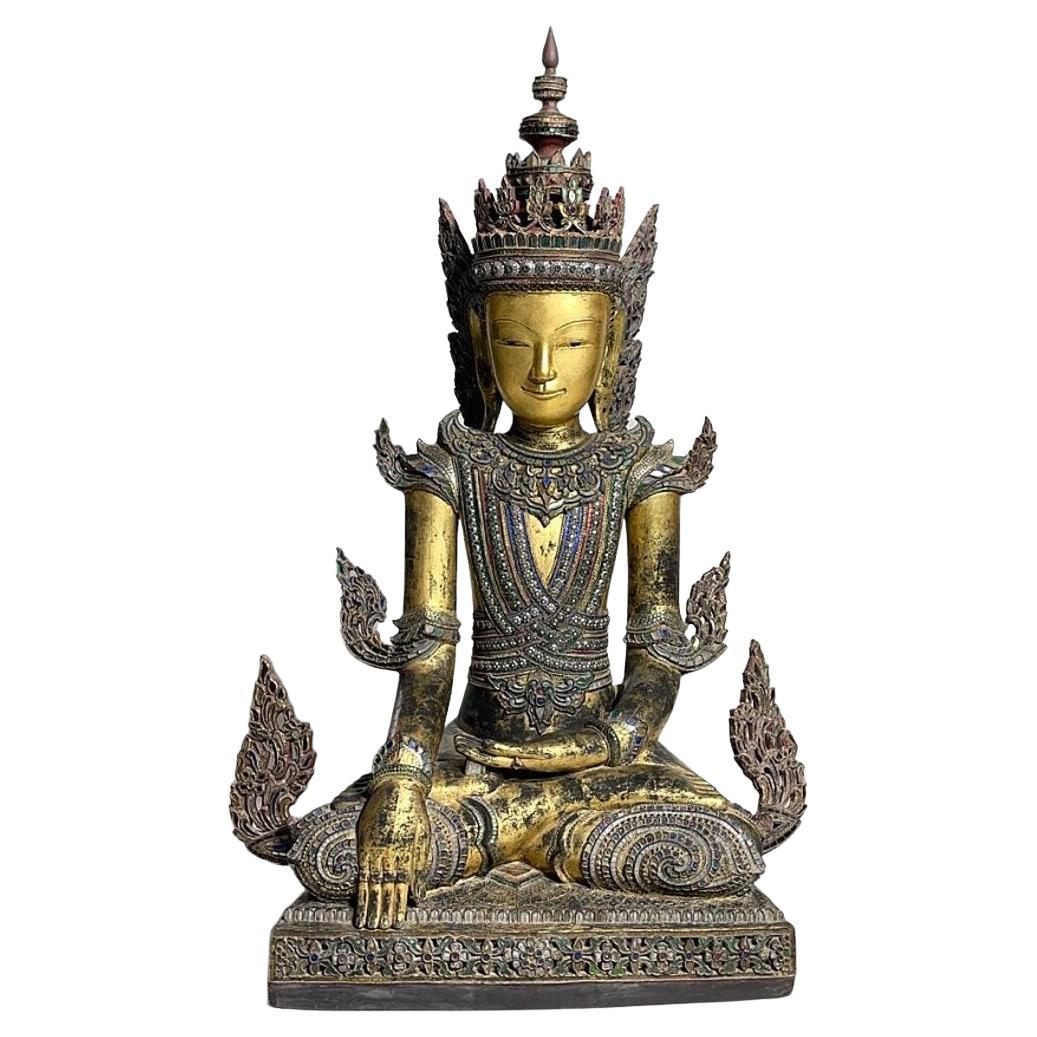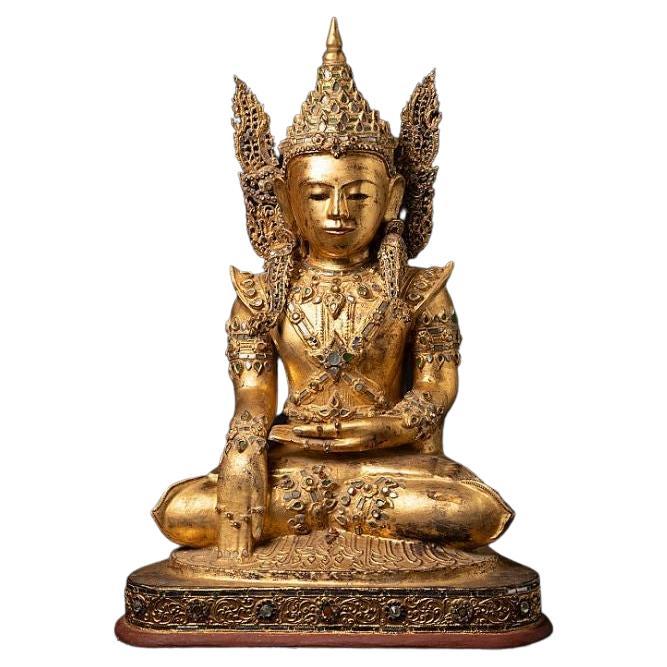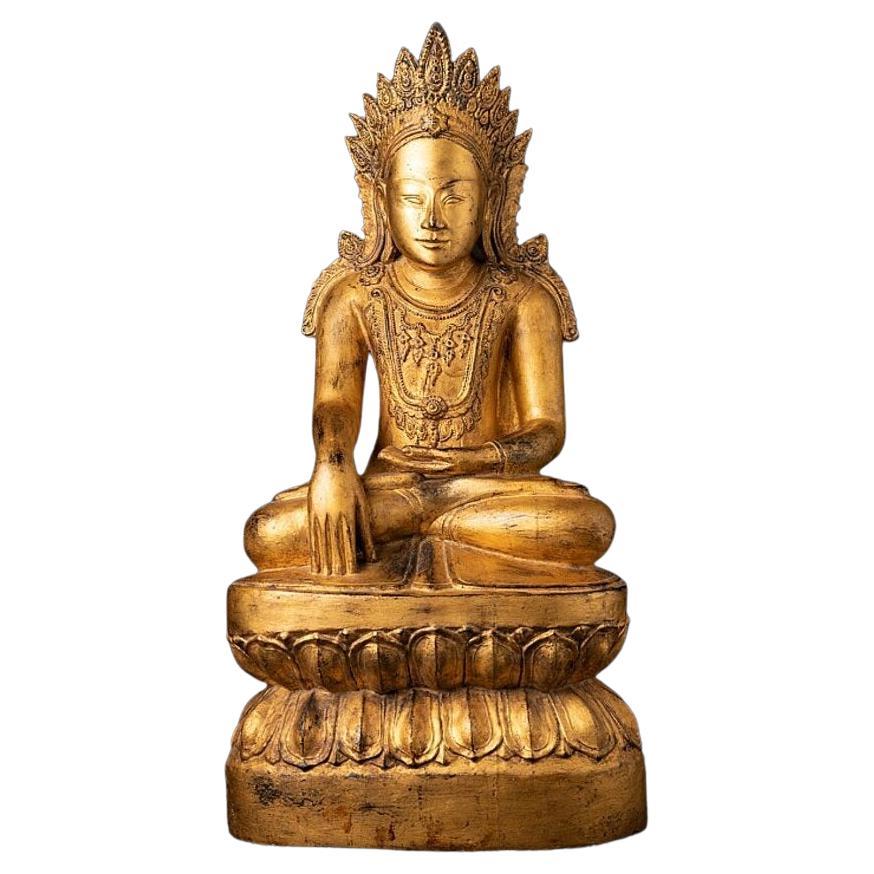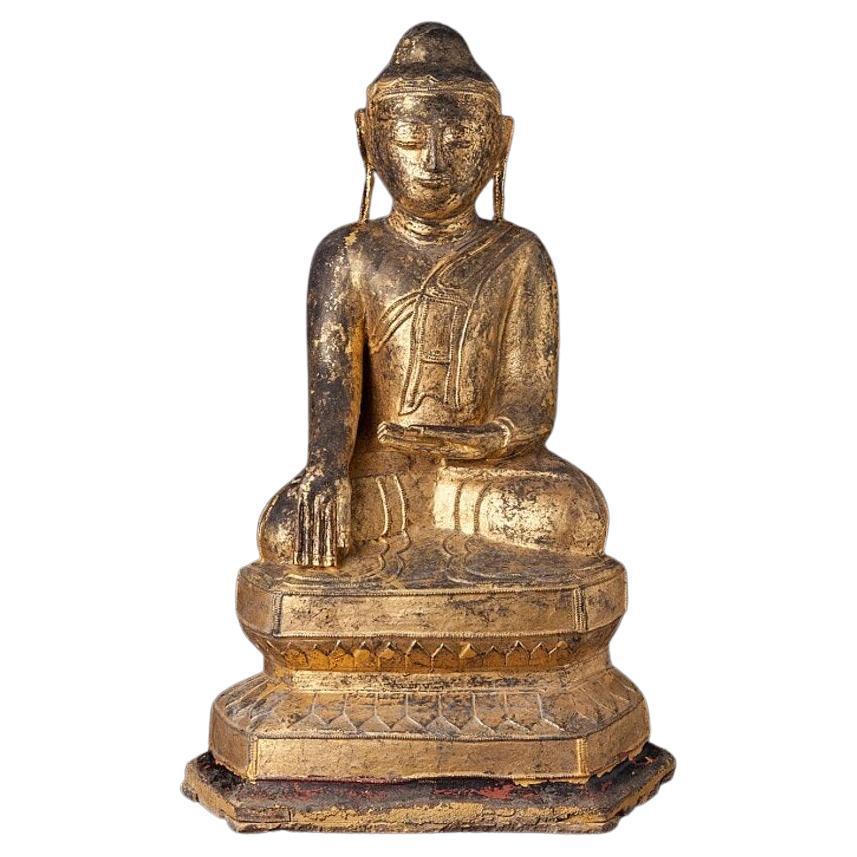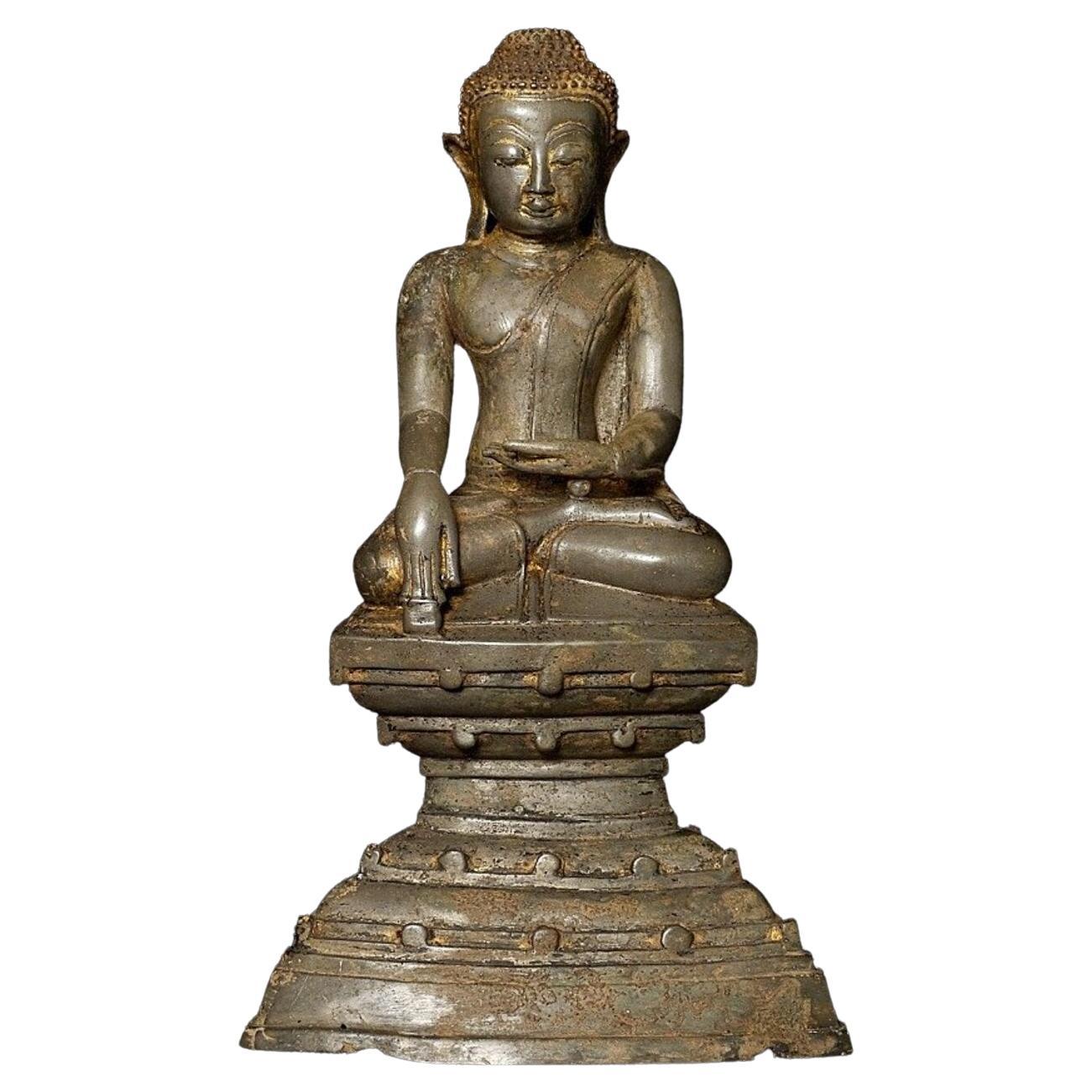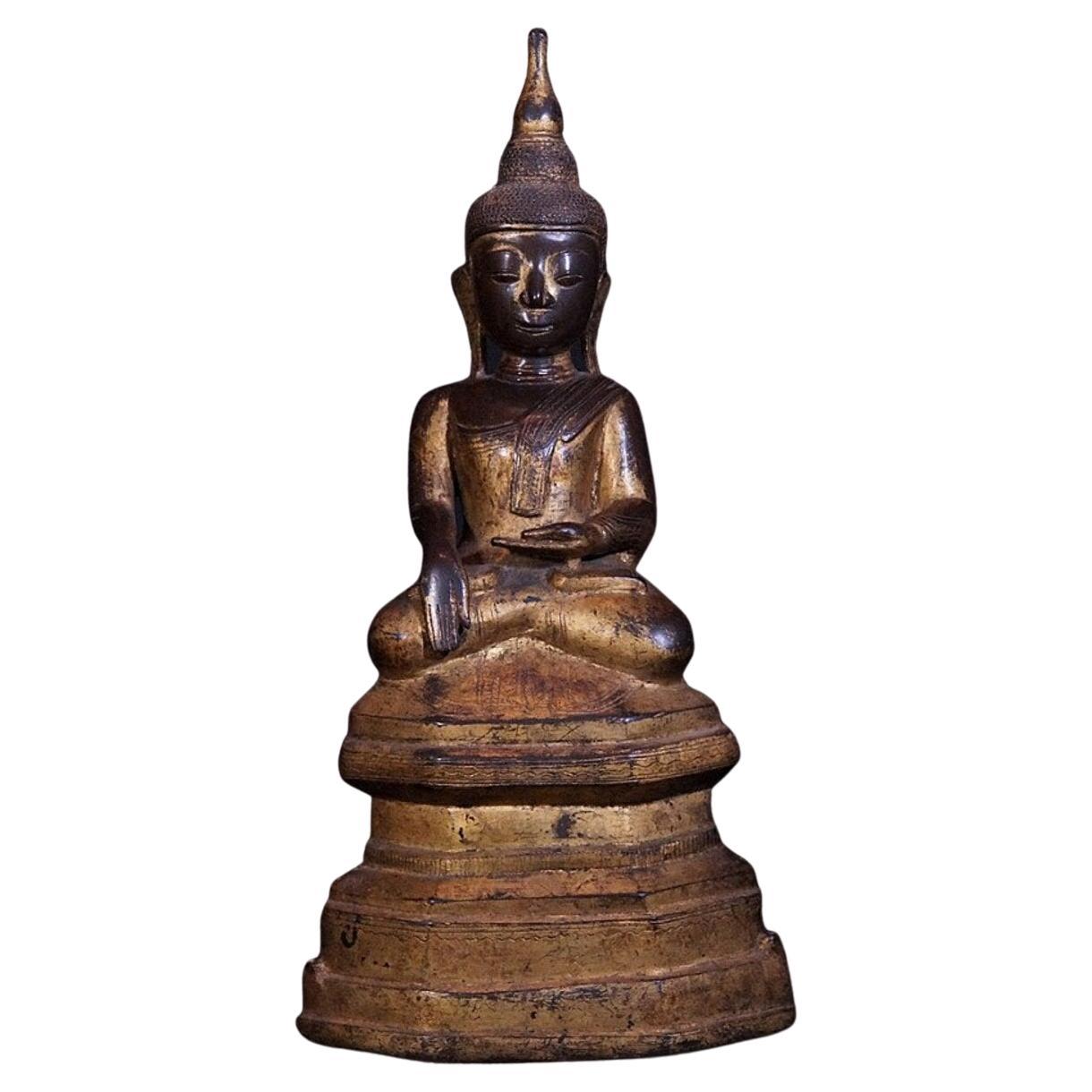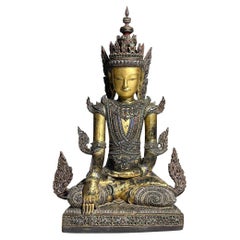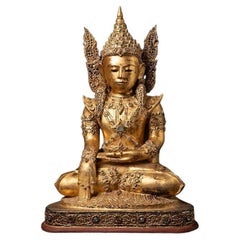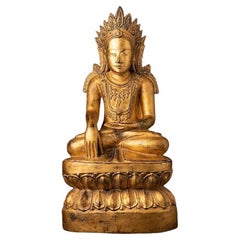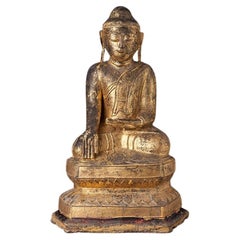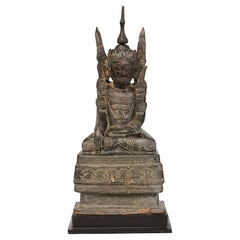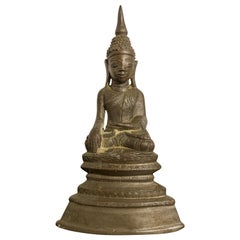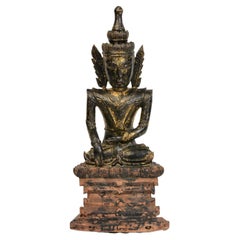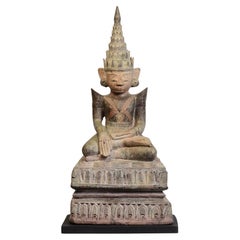Items Similar to 18th Century Crowned Shan Buddha Statue from Burma
Video Loading
Want more images or videos?
Request additional images or videos from the seller
1 of 22
18th Century Crowned Shan Buddha Statue from Burma
$12,903.63per item
£9,590.91per item
€10,839per item
CA$17,816.37per item
A$19,757.03per item
CHF 10,380.86per item
MX$241,397.37per item
NOK 129,878.67per item
SEK 121,913.32per item
DKK 82,533.56per item
Quantity
About the Item
Material: bronze
61,2 cm high
34 cm wide and 20,1 cm deep
Weight: 14.65 kgs
With traces of 24 krt. gilding
Shan (Tai Yai) style
Bhumisparsha mudra
Originating from Burma
18th century
Special !
- Dimensions:Height: 24.1 in (61.2 cm)Width: 13.39 in (34 cm)Depth: 7.92 in (20.1 cm)
- Materials and Techniques:
- Place of Origin:
- Period:
- Date of Manufacture:18th Century
- Condition:Wear consistent with age and use.
- Seller Location:DEVENTER, NL
- Reference Number:Seller: 35021stDibs: LU7845232174202
About the Seller
5.0
Platinum Seller
Premium sellers with a 4.7+ rating and 24-hour response times
Established in 1997
1stDibs seller since 2022
60 sales on 1stDibs
Typical response time: 6 hours
- ShippingRetrieving quote...Shipping from: DEVENTER, Netherlands
- Return Policy
Authenticity Guarantee
In the unlikely event there’s an issue with an item’s authenticity, contact us within 1 year for a full refund. DetailsMoney-Back Guarantee
If your item is not as described, is damaged in transit, or does not arrive, contact us within 7 days for a full refund. Details24-Hour Cancellation
You have a 24-hour grace period in which to reconsider your purchase, with no questions asked.Vetted Professional Sellers
Our world-class sellers must adhere to strict standards for service and quality, maintaining the integrity of our listings.Price-Match Guarantee
If you find that a seller listed the same item for a lower price elsewhere, we’ll match it.Trusted Global Delivery
Our best-in-class carrier network provides specialized shipping options worldwide, including custom delivery.More From This Seller
View AllVery special large Burmese Shan Buddha statue from Burma
Located in DEVENTER, NL
Material: lacquerware
127 cm high
83 cm wide
Gilded with 24 krt. gold
Shan (Tai Yai) style
Bhumisparsha mudra
Originating from Burma
18th century
A very beautiful and large piece !
...
Category
Antique 18th Century Burmese Sculptures and Carvings
Materials
Lacquer
Special Large Antique Crowned Buddha Statue from Burma
Located in DEVENTER, NL
Material: lacquerware
Measures: 76,8 cm high
53,5 cm wide and 34,5 cm deep
Weight: 8.45 kgs
Gilded with 24 krt. gold
Arakan style
Bhumisparsha mudra
Originating from Burma
1...
Category
Antique 19th Century Burmese Sculptures and Carvings
Materials
Lacquer
Special Antique Wooden Crowned Buddha Statue from Burma
Located in DEVENTER, NL
Material: wood
69,5 cm high
35,6 cm wide and 25 cm deep
Weight: 13.5 kgs
Gilded with 24 krt. gold
Shan (Tai Yai) style
Bhumisparsha mudra
Originating from Burma
Early 19th c...
Category
Antique Early 19th Century Burmese Sculptures and Carvings
Materials
Wood
Antique Burmese Shan Buddha Statue from Burma
Located in DEVENTER, NL
Material: lacquerware
46,7 cm high
30,5 cm wide and 21,1 cm deep
Weight: 0.904 kgs
Gilded with 24 krt. gold
Shan (Tai Yai) style
Bhumisparsha mudra
Originating from Burma
18...
Category
Antique 18th Century Burmese Sculptures and Carvings
Materials
Lacquer
18th Century Burmese Buddha Statue from Burma
Located in DEVENTER, NL
Material: bronze
32,5 cm high
Weight: 4.143 kgs
With traces of the original 24 krt. gilding
Shan (Tai Yai) style
Bhumisparsha mudra
Originating from Burma
18th Century.
Category
Antique 18th Century Burmese Sculptures and Carvings
Materials
Bronze
18th Century Burmese Buddha Statue from Burma
Located in DEVENTER, NL
Material: bronze
45 cm high
22 cm wide
Weight: 8 kgs
Gilded with 24 krt. gold
Ava style
Bhumisparsha mudra
Originating from Burma
18th century
Very special !
Category
Antique 18th Century Burmese Sculptures and Carvings
Materials
Bronze
You May Also Like
18th Century, Shan, Antique Burmese Wooden Seated Crowned King Buddha Statue
Located in Sampantawong, TH
Antique Burmese wooden seated crowned Buddha or sometimes known as 'King Buddha's, wearing diadem-crowns and ornaments of kings instead of ordinary monk's robes.
Crowned Buddha repr...
Category
Antique 18th Century Burmese Antiquities
Materials
Wood
Small Burmese Shan Tai Yai Bronze Buddha, 18th Century, Burma
Located in Austin, TX
A decidedly charming small cast bronze figure of the Buddha, 18th century, Shan Tai Yai peoples, Burma (Myanmar).
The small image of the Buddha is portraye...
Category
Antique 18th Century Burmese Sculptures and Carvings
Materials
Bronze
18th Century, Shan, Antique Burmese Wooden Seated Crowned Buddha
Located in Sampantawong, TH
Burmese wooden seated crowned Buddha, or sometimes known as 'King Buddha', wearing diadem-crowns and ornaments of kings instead of ordinary monk's robes.
Age: Burma, Shan Period, ...
Category
Antique 18th Century Burmese Antiquities
Materials
Wood
$1,072 Sale Price
20% Off
18th Century, Shan, Antique Burmese Wooden Seated Crowned King Buddha
Located in Sampantawong, TH
Antique Burmese wooden seated crowned Buddha or sometimes known as 'King Buddha's, wearing diadem-crowns and ornaments of kings instead of ordinary monk's robes.
Crowned Buddha repr...
Category
Antique 18th Century Burmese Antiquities
Materials
Wood
Antique Lopburi Buddha Statue from Thailand
Located in Atlanta, GA
The Buddha statue was made from a copper alloy in a standing position with hands in double Abhaya mudra. This mudra symbolizes the act of dispelling fear in the face of adversity. In Laos and Thailand where this mudra are used as one of the most iconic gestures, with its origin was pre-Buddhism era, when it was a symbol of good intentions and friendship when approaching strangers. In contrast to Indian iconography, it was often shown with both hands raised to the level of the shoulder in Southeast Asia. The statue was made in the classic Lopburi style, which historically was heavily influenced by Khmer art...
Category
Antique Late 18th Century Thai Other Sculptures and Carvings
Materials
Metal
18th Century, Shan, Antique Burmese Wooden Seated Buddha
Located in Sampantawong, TH
Burmese wooden Buddha sitting in Mara Vijaya (calling the earth to witness) posture on a base.
Age: Burma, Shan Period, 18th Century
Size: Height 53.5 C.M. / Width 20.5 C.M. / Depth...
Category
Antique 18th Century Burmese Antiquities
Materials
Wood
$960 Sale Price
20% Off
More Ways To Browse
Antique Gold Crown
Bronze Sculpture 18th Century
18th Century Buddha
Shan Buddha
Crown Buddha
Crowned Buddha
Bronze Buddha 18th Century
Japan Mask
Indian Temple
Chinese Jade Carvings
Large Buddha Sculpture
Buddha Stand
Head Bronze Asian
Antique Hindu
19th Century Monk
Antique Dragon Head
Antique Gold Buddha Statue
Chinese Stone Carvings
